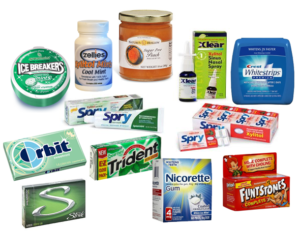Let’s face it, it’s difficult to not give our most-loved furry friends some human food they adore. Those pleading eyes, the tail wag or purrs. But when it comes to certain foods, you must stay strong. “No” is the best answer.
One of those dangerous, toxic, no-go food items is an additive called Xylitol. It may taste great to humans and animals alike, but it’s highly dangerous for our pets.
To get the word out, and properly inform our friends and family, we are reposting this important article from our friends at the ASPCA. (The link to the ASPCA article on their page is here.)
 You may have already heard of xylitol, a natural sugar alcohol that is most often used as a sweetener. Though we’ve talked about the dangers of this product before, the ASPCA Animal Poison Control Center (APCC) wants to give you an updated look at this toxic ingredient.
You may have already heard of xylitol, a natural sugar alcohol that is most often used as a sweetener. Though we’ve talked about the dangers of this product before, the ASPCA Animal Poison Control Center (APCC) wants to give you an updated look at this toxic ingredient.
Originally found in birch bark, it can now be produced using corncob remnants from ethanol plants, making it inexpensive to produce. Xylitol has several properties that make it appealing for use in dental and skincare products. In addition to its use as a sweetener, xylitol can also:
- Prevent tooth decay and cavities
- Kill mouth bacteria
- Provide a low glycemic index in people
- Have a cooling effect in oral and nasal cavities
- Maintain moisture in products
Due to these beneficial properties for people and its low cost, xylitol is likely to become even more prevalent, so it’s important for consumers to be aware of the dangerous effects it can have in dogs.
Can it harm my dog? Is it dangerous for other animals?
In some species, particularly dogs, xylitol causes a sudden release of insulin. That insulin then causes the dog’s blood sugar to drop, causing hypoglycemia. Dogs will often vomit and become lethargic or weak, and sometimes they can even have seizures. This can be very dangerous, but can be corrected by providing intravenous dextrose (a.k.a sugar) at a veterinary hospital. Dogs who become hypoglycemic after eating xylitol will need dextrose supplementation in a vet hospital for 12 to 24 hours, sometimes longer.
Another problem that xylitol can cause for dogs is liver damage. We don’t know why this happens, but liver enzymes often become elevated in dogs after they eat xylitol. In most cases, the liver enzyme elevations are mild, and dogs recover completely with a little help from medication that protects the liver. However, very large doses of xylitol in dogs can lead to liver failure, which is a much more serious and possibly fatal condition.
We can also see these effects in rabbits, and to a lesser extent, in cows, baboons and goats.
Luckily people, cats and ferrets are not negatively affected by xylitol.
What types of products can I find it in?
By far the most common xylitol-containing product that dogs get into is sugarless gum. Gum that comes in the larger “car cups” can be particularly dangerous because these typically contain 40 to 50 pieces. The amount of xylitol per piece of gum varies not just between different brands, but also between different types or flavors of the same brand. If you see xylitol listed as the first ingredient on your gum, keep it away from your dogs! Dogs especially like to go through purses, bags and backpacks to find gum.
Other commonly encountered products that may contain xylitol include:
- Sugar-free foods (peanut butter, candy, pudding, ice cream, energy bars, protein powder)
- Chewable or gummy vitamins/medications
- Liquid prescription medications
- Dental products (tooth paste, dental floss, mouth rinse)
- Nasal sprays
- Skin care products
What should I do if my dog eats something with xylitol in it?
First and foremost, don’t panic. If your dog is acting normal, call APCC at 888-426-4435, so we can help you determine if your dog needs any treatment. If your dog is symptomatic, take them to a veterinarian immediately. Be sure to bring any packaging with you from the product that was ingested and tell the veterinary staff that your dog ate xylitol.
Depending on the amount of xylitol ingested, they may recommend keeping your dog in the hospital to monitor their blood sugar and possibly starting medication to protect the liver. Most dogs do recover even with large xylitol ingestions, but veterinary intervention is often required.
If your dog gets into a product that you know has xylitol, or could potentially have xylitol in it, contact your veterinarian or the ASPCA Animal Poison Control Center at 888-426-4435 to determine how serious the exposure might be and what care might be required.
